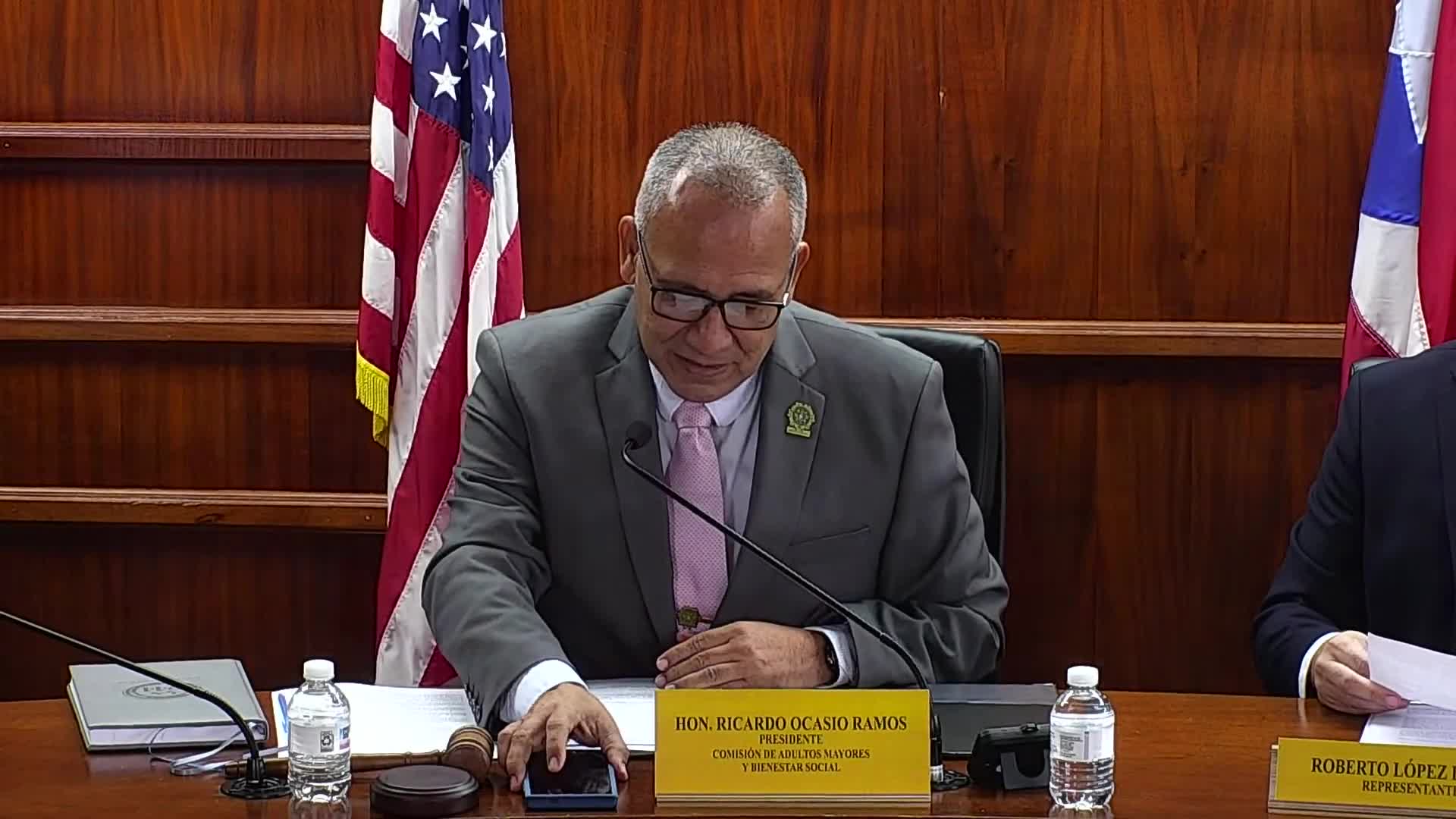Puerto Rico hearing advances discussion on unified ID for older adults and people with disabilities
Get AI-powered insights, summaries, and transcripts
Subscribe
Summary
Witnesses at an Oct. 20 House commission hearing backed Proyecto de la Cámara 872’s aim to add a symbol to driver’s licenses and ID cards to identify older adults and people with disabilities, while agencies and advocates raised implementation, privacy and economic concerns and asked for more data.
Representatives, agency officials and advocates met Oct. 20 at a public hearing of the Commission on Older Adults and Social Welfare of the House of Representatives of Puerto Rico to review Proyecto de la Cámara 872, a measure that would create a uniform supplemental-rights identification for older adults and people with disabilities by adding a distinctive symbol to driver’s licenses and identification cards.
The bill, Proyecto de la Cámara 872, would amend existing statutes and consolidate identification for benefits currently administered through different laws, including references in testimony to Ley Núm. 108 (12 de julio de 1985) and Ley Núm. 107 (1998) and provisions cited from the law identified in testimony as “Ley Núm. 297 (2018).”
Why it matters: Supporters said a single, recognizably marked credential would reduce bureaucratic steps for people who now must obtain separate cards from different agencies to access discounts, priority lines and other benefits. Opponents and some agency witnesses urged the committee to quantify fiscal impacts on event producers and transit providers and to strengthen privacy and medical-certification safeguards.
Department positions and technical details
Maribel Rivera Colón, director auxiliar de servicios al conductor at the Department of Transportation and Public Works (DTOP), told the commission DTOP supports the initiative and recommended approval, while noting operational details. Rivera Colón said the design and rollout of a new symbol will take time and asked that the law allow 120 days for regulatory amendments to implement the symbol prospectively. She added that physical cards are replaced on renewal; the department expects incorporation of the symbol when a card is reprinted at renewal (DTOP licenses and IDs have an eight-year validity, the witness said).
Luis N. Olmedo Morales, signing for the Department of Health, said the health department supports the bill “sin reserva” and described existing benefits tied to identification — for example, discounts on admission to cultural and recreational events and reduced or free municipal and government transport for people 70–75 and older, depending on current programs. Olmedo also provided a usage figure to the committee: “Se han emitido hasta ... 4,030 tarjetas ... en este año” (4,030 cards issued so far this year, through Oct. 8, 2025).
Operational programs and fiscal questions
Arlin Martínez, vice president of intermodal programming at the Autoridad Metropolitana de Autobuses (AMA), outlined AMA’s current programs: a reduced fare program (reported in testimony as 60 cents for eligible riders), a “Programa Dorado” that provides free travel for people 75 and older, and a paratransit program (Ya Mi Viaje). AMA officials said changing the age threshold for free travel from 75 to 70 — a change proposed in the bill — would be primarily administrative and require updates to rules and manuals, but could have a modest fiscal impact.
Raúl Márquez Hernández, legal adviser for the Compañía de Turismo de Puerto Rico, said the tourism corporation does not operate ticketed events and recommended the committee seek formal comments from DTOP and the Department of Health and from municipalities, producer associations or the federation of mayors about impacts on event producers. Joel Pisabatiz (Municipio de San Juan) urged the committee to request ticket-sales data from large producers and noted the municipality operates many free cultural offerings; he said the municipality supports retaining benefits for older adults but recommended empirical input from producers.
Advocates and safeguards
Aida González, speaking for AARP Puerto Rico, supported the bill but urged careful drafting to protect privacy and medical confidentiality for people with mental-health conditions and to ensure regulations make clear when medical certification is required. AARP suggested clarifying that a second discounted ticket could be used by an accompanying caregiver and recommended the commission analyze carefully the effect of repealing existing statutes.
Several witnesses recommended that, for persons with disabilities, DTOP require a medical professional’s statement before issuing a permanent marking (a process analogous to the removable parking placard system). DTOP and Health representatives said they would work together on documentation and staff training; DTOP indicated it can incorporate a symbol into digital/virtual licenses immediately and into physical cards at the time of replacement or renewal.
Committee requests and next steps
During the hearing, commissioners asked agencies and stakeholders to provide additional data within a short timeframe: ticket-sales statistics or estimates from large event producers; AMA and municipal statistics on program enrollment and usage broken down by age groups; and an official cost/impact estimate from agencies and producers. The commission closed the hearing at 10:37 a.m. and did not take formal votes on the bill at the session.
What was not decided
The hearing produced no formal committee vote. Several substantive questions remain open and were formally requested by the commission: a quantified fiscal impact on event producers and transit agencies; a regulatory timetable for DTOP to implement the symbol (witnesses recommended 120 days for rulemaking and prospective application); and clarifications about whether the second discounted ticket should explicitly be available for an accompanying caregiver.
The hearing transcript records detailed back-and-forth on privacy (including references to patient-confidentiality obligations under health statutes), the technical feasibility of symbol integration, and whether reducing the eligibility age for some benefits (from 75 to 70) would materially affect transit budgets. Agencies agreed to submit requested statistics and technical comments to the committee.
Ending
The commission signaled continued review and asked DTOP, the Department of Health, AMA, the Municipality of San Juan and representative organizations to submit the requested data and formal written comments for the committee’s further consideration.
